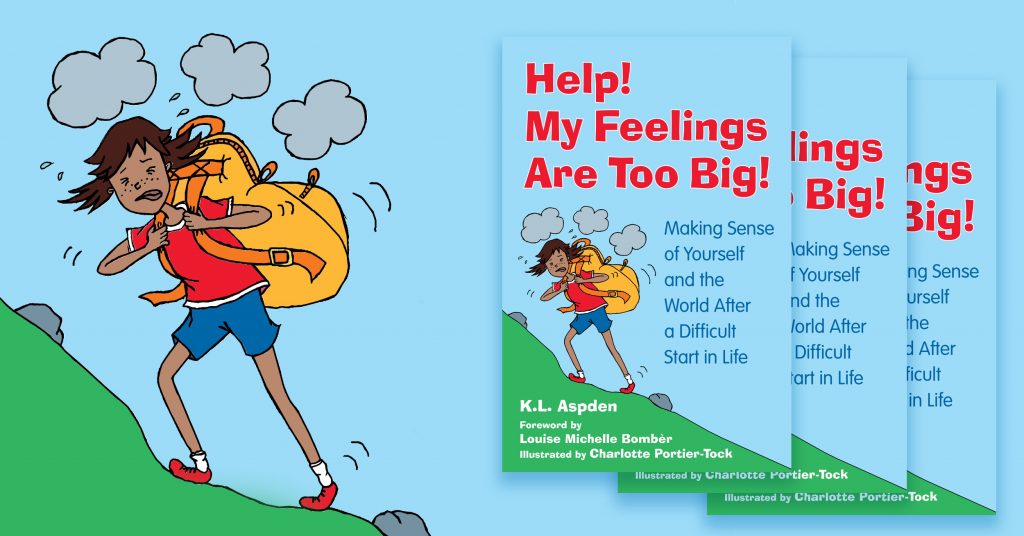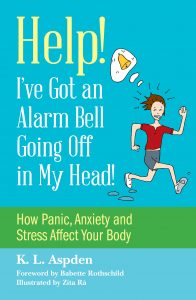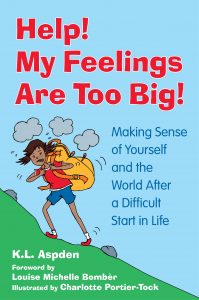
Hi Louisa, and congratulations on your newly published book Help! My Feelings Are Too Big! Thanks for taking some time out to answer some questions about it.
What is your book about and who is it for?
This book is for children aged 9 and above, especially those who have had disruption in their early relationships. It is intended to be used as a tool to help them understand the effects of their experiences because they often have extreme emotions to cope with. Children would probably benefit most from reading this with a supportive adult.
It explains the impact of early relationships on children’s bodies and minds as they grow, and shows how early attachments affect the way we experience life, and see the world.
The book is adult friendly too and grown-ups who have struggled with these issues may also gain insight by reading it.
What experiences as a practitioner have led you to create this resource?
For nine years I worked in a school for children with emotional and behavioural difficulties. Many of them had experienced trauma very early in their lives. I learned a lot just by spending time with them. Some of them had been given the label ‘attachment disorder’ but didn’t really know what that meant. They just believed that there was something wrong with them. I wanted to say ‘No – there is nothing wrong with you… it’s not your fault.’
In my search for resources I found lots of material written for professionals and carers, but nothing which spoke to children directly. I felt that we owed it to them, to try and give an explanation.
I knew writing this book would be a challenge and that some children will not be ready to face these issues, but I wanted to try. And I wanted to provide them with some scientific information to help them understand.
Why do you think that it is important for children as young as 9 to understand the effects of early trauma?
Lots of children with attachment issues believe deep down that they are bad. If it is possible for them to understand that what happened to them as babies is affecting them now, and show them how, it can be a huge relief. If they can learn over time to have compassion on themselves then it will have a tremendous effect on their mental health in the future.
Is there a risk of causing further damage at that age by suggesting to children that they are traumatised?
Giving a child a label is not necessarily helpful. They don’t need to be given the idea ‘there’s something wrong with me’.
But many children, particularly those in foster care and those who are adopted will be aware of their background, and that there were difficulties. If they are having some strong emotions and reactions that are confusing, it could be very useful for them to understand the connection.
The subject should be approached very gently and a child can choose whether or not to identify with one of the characters.
Will readers already familiar with your previous book Help! I’ve Got an Alarm Bell Going Off in My Head! Find a similar approach in Help! My Feelings Are Too Big!?
 The ‘Alarm Bell’ is all about the fight/flight/freeze reaction. It is relevant to everyone as we all have an amygdala (alarm bell) which is there to protect us in emergencies. But it can be set off accidentally when we don’t need it, and this can cause some extreme reactions. I wanted to help children understand what can happen in our bodies and emotions so they can feel more in control and can ask for help without feeling ashamed. It includes ideas about what can help them feel calmer.
The ‘Alarm Bell’ is all about the fight/flight/freeze reaction. It is relevant to everyone as we all have an amygdala (alarm bell) which is there to protect us in emergencies. But it can be set off accidentally when we don’t need it, and this can cause some extreme reactions. I wanted to help children understand what can happen in our bodies and emotions so they can feel more in control and can ask for help without feeling ashamed. It includes ideas about what can help them feel calmer.
The new work also has an element of ‘science’ explaining how what happens in our lives affects our alarm system. The children I am addressing in this book often have more ‘alarm bell reactions’ because early memories which are stored in our brains in the form of fragments such as colours, smells, sounds, etc. can be triggered by reminders which happen in our everyday lives. It is not easy for any of us to make the connections between what happened then, and now, because mostly we are not conscious of them.
The subject covered in Help! My Feelings are Too Big! is more complex than the first book. As well as the science, it explains the belief systems which develop in us as a result of our attachment experiences. Like the ‘Alarm Bell’, it includes some suggestions that may be helpful.
Your book is split into two sections, ‘Beginnings’ and ‘Hope’, why is this?
The first part of the book looks at the stories of two fictional children – George and Asha – one with healthy attachments and the other with a difficult attachment. It outlines the challenges faced by Asha and explains why it is so hard for her. It is about how her ‘beginning’ affected her.
The second part – ‘Hope’, offers suggestions about what might help a child like Asha. It is hard for such children to think that there is any chance of things feeling better, but maybe some of the ideas here will be helpful.
What is your favourite reflective exercise in the book, and why?
There are quite a few suggestions but I think it would be great if adults were able to use them as a spring board with the children they are supporting.
For example, on pages 59–60 there are some thoughts about what might help a child to care about the part of them that still feels like a baby and has unmet needs. An adult and child could work together to make a box or bag of items to support the ‘inner child’. Anything collaborative between an adult and child in this context could in itself be a healing intervention because it is promoting trust and cooperation.
 Help! My Feelings Are Too Big!
Help! My Feelings Are Too Big!
Making Sense of Yourself and the World After a Difficult Start in Life – for Children with Attachment Issues
How do you cope when your feelings are just too big? Working through complex issues with respect and compassion, this illustrated children’s book explores the emotional impact of anxiety, attachment disorders or early trauma. Age-appropriate language and activities help calm children, build trust and repair relationships.
£9.99 – Buy the book
If you would like to read more articles like this and get the latest news and offers on our mental health books, why not join our mailing list? We can send information by email or post as you prefer. You may also be interested in liking our Social Work, Mental Health and Health Care Facebook page.